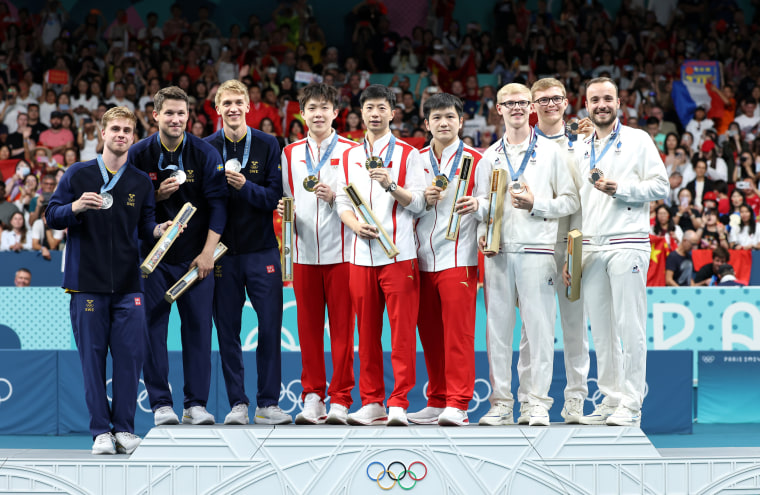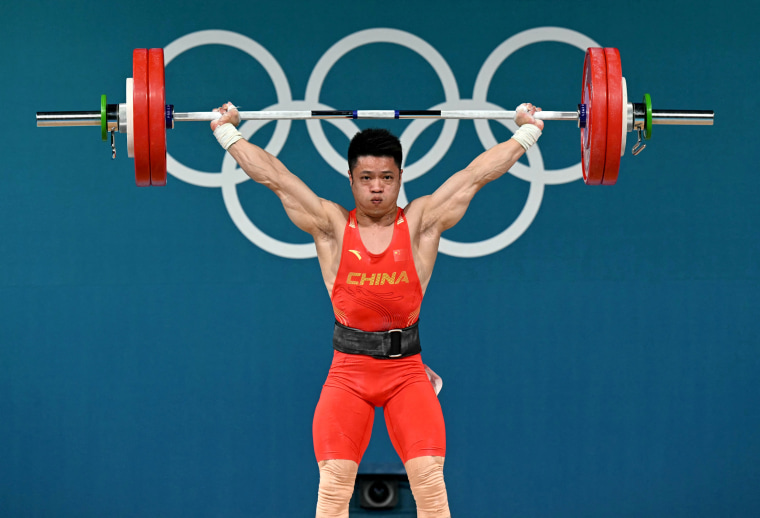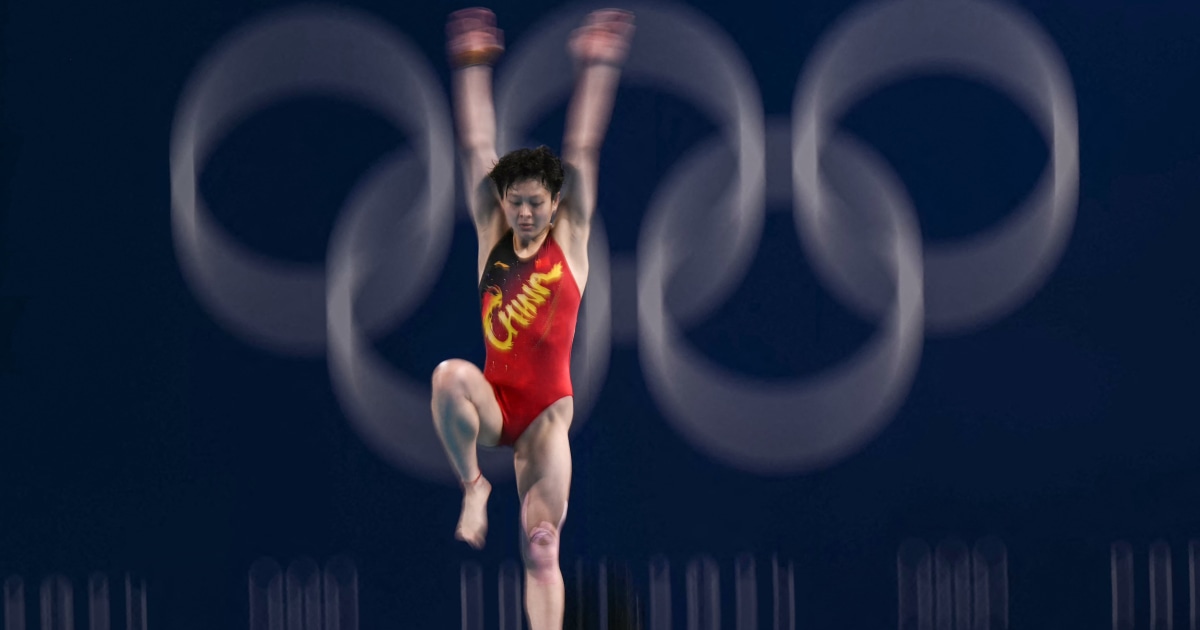PARIS — Everywhere you looked at the 2024 Paris Games, Americans dominated. Team USA sent by far the most athletes. Hordes of stars-and-stripes-clad tourists made the trip across the Atlantic. And celebrities like Snoop Dogg and Lady Gaga became the Games’ cultural icons.
There is one crucial metric in which the United States did not smash the competition, however: gold medals.
On the final day of the Games, China is leading Team USA in the medal table, with 39 golds to America’s 38. (While the American news media typically goes on total medals, most of the rest of the world, including Paris 2024’s official count, bases its table on golds won.)
Whereas Team USA has focused on athletics and swimming, China majors in diving, table tennis, weightlifting, shooting and badminton. In fact, around a fifth of China’s 302 golds since 1984 have come in diving. This year was no different, with China winning every diving gold available.
“I’m very proud of China and all the gold medals it has won,” said Fang Zheng, 30, a Chinese student studying in France who was lining up to watch breaking Friday. “When an athlete wins gold, it’s an honor for themselves and their families, but also the country.”
This year, China is also making breakthroughs in disciplines typically dominated by the U.S., namely swimming. Its two golds here included the 4×100-meter medley, the first time in Olympic history that anyone had beaten the U.S.
The star of the show was Pan Zhanle, who jetted away from American Hunter Armstrong in the anchor leg, having already set a world record in the 100-meter freestyle five days before. The losing U.S. team contained 10-time Olympic medalist Caeleb Dressel, who had to settle for silver.
Meanwhile, Zheng Qinwen became the first Asian tennis player to win women’s gold, and China’s winning artistic swimming score blew the U.S. and Spain out of the water. The Chinese routine, “Light of Life,” wowed the judges by creating a physical representation of the “mountain” the team had to overcome to win gold. Though Russia, a longtime dominant force in the sport, was excluded from these Games, China still achieved a score that far outstripped any competitors.
“Their execution is just out of this world,” Team USA’s Jacklyn Luu said.
China has also been quick to embrace some of the newer Olympic sports including sport climbing, skateboarding, surfing and breaking. Deng Yawen won gold in women’s BMX freestyle in her Olympic debut. And China also has the youngest athlete at these Games, 11-year-old skater Zheng Haohao.
China’s newfound prowess in the pool has not come without significant scrutiny, however, after it emerged that 23 swimmers — including 11 who went to Paris — had tested positive for banned heart medication in 2021 but were still allowed to compete.
China’s doping agency said they had eaten contaminated food, an explanation accepted by the World Anti-Doping Agency, WADA, which did not make the incident public until it was revealed by a New York Times investigation earlier this year.
China vehemently denies allegations of doping, with a foreign ministry spokesperson telling NBC News last month that “Chinese swimmers are clean and have never feared testing.”

They also accused the U.S. anti-doping agency, USADA, of double standards after it was revealed that the Americans had allowed athletes who tested positive between 2011 and 2014 to continue competing if they went undercover to catch other dopers.
China has also zeroed in on American sprinter Erriyon Knighton, who tested positive for the performance enhancer trenbolone in March but, like the Chinese athletes, was cleared after his own country’s agency said he had eaten contaminated meat.
The current American-Chinese Olympic rivalry is part of a geopolitical sporting duopoly that has existed since around 2004. Though the U.S. tends to win, when Beijing hosted the Games in 2008 it swept the field with 51 golds to Team USA’s 36.
How it does this is no secret and in many ways is similar to the U.S. and other countries.
It has pumped ever more funding into the Games while focusing on specific sports that it knows will return a healthy number of honors. Having 1.4 billion people does not hurt, of course, although as India will attest (no golds, one silver and five bronzes in Paris this year), having a colossal potential talent pool does not guarantee success.
The last time an opaque, one-party state accused of running a doping program rivalled the USA on the medal table, it was the Soviet Union.
Back in those Cold War days, China’s Olympic program was still in its infancy.

After the 1949 communist revolution, Chinese leader Mao Zedong promoted exercise as not only an athletic imperative — building a strong, healthy working class and to defend the nation — but also as a cultural and political necessity. This would “serve the political purpose of building a class of citizens who were well-disciplined in both mind and body,” according to the Michigan-based nonprofit Association for Asian Studies in its journal Education About Asia.
And at the Helsinki Games in 1952 that China saw just how potent a geopolitical weapon the Olympics could be. The Soviet Union achieved huge success, running the U.S. close in the medal table and showing “how a socialist country could defeat Western democratic countries on the international stage,” the essay in Education About Asia said.
China wouldn’t win its first medals for another 30 years, however, after it withdrew from the International Olympic Committee in protest over the participation of Taiwan, which it sees as a rogue province that rightfully belongs to Beijing.
The international sporting freeze began to thaw in the 1970s, first with the historic “pingpong diplomacy” of 1971, in which the U.S. table tennis team became the first international sporting delegation to tour China in decades, paving the way for a visit by then-President Richard Nixon a year later. This direction of travel was further expedited in the late 1970s with the “reform and opening up” policies enacted by Deng Xiaoping after Mao’s death.
China finally returned to the Games at Los Angeles in 1984 following an IOC agreement that said Taiwan would compete under the name “Chinese Taipei.” Beijing soon became a medal machine, crescendoing at Beijing in 2008. This landmark event in the country’s modern history coincided with its meteoric economic rise as the West ailed under the financial crisis the same year.

Amid heavy criticism, the IOC said these Games would help revolutionize politics and human rights in what was then the world’s most populous country. That never came.
Under President Xi Jinping, who came to power four years later, China has become more authoritarian, according to Western governments and watchdogs, an assessment that Beijing rejects.
Today, all countries see success in the Games as a way to project power internationally. But China takes this to a whole new level, where golds are not only seen as a totem of nationalistic pride, but silvers are often lambasted on Chinese social media.
Meanwhile its State Council has vowed to make China “a modern leading sports socialist country by 2050” and its “global influence in sports should be ranked near the top globally.”
And in this new era of Sino-Western rivalry, the Olympics are also used by more nationalistic elements of the Chinese media as a way to portray China in a positive light against the perfidious Americans and Europeans. The doping argument at these Games has only intensified this dynamic.
“The U.S. using its hegemonic influence and power to contain China and other competitors in sports is truly a disgrace and unsportsmanlike,” sports commentator Li Xiang told the hawkish Global Times newspaper Friday. China, on the other hand, “has demonstrated charm and sportsmanship in Paris, as Chinese young athletes win friendship and respect from their rivals and foreign audiences,” Li said.

